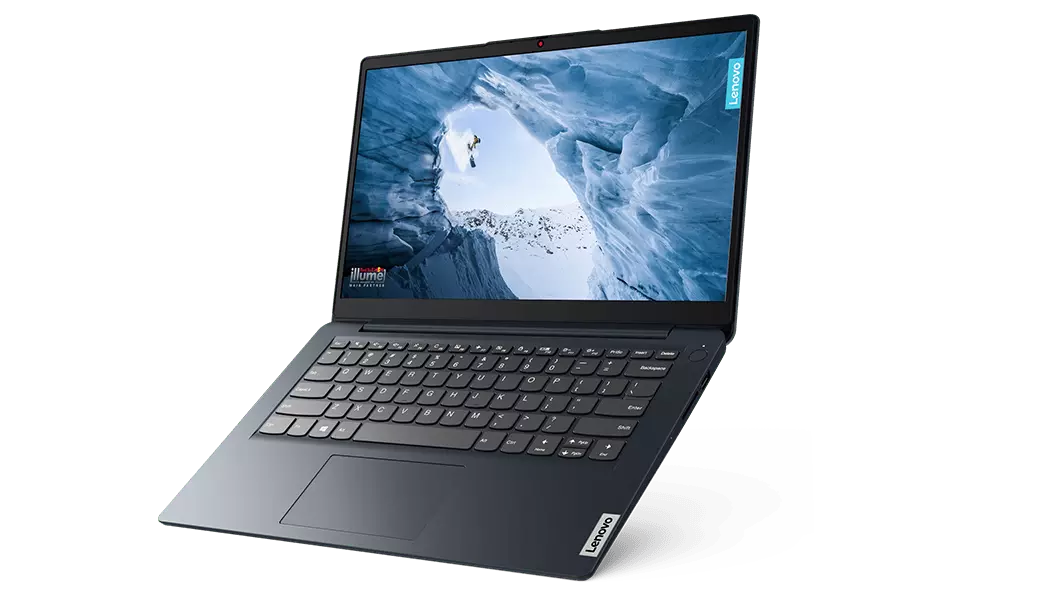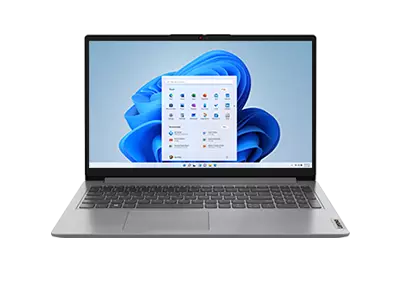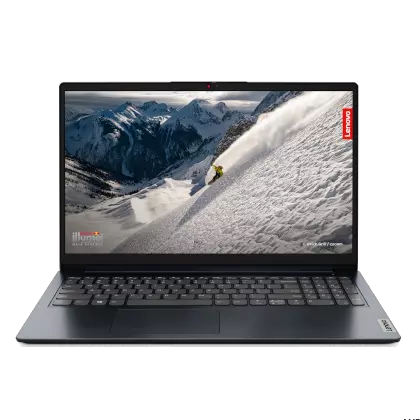-
Accessibility
-
Contact Us
Sales:
Order Support:
-
Rewards
-
Account
-
Cart
-
Discover the latest PCs at Lenovo.com >
|
410 Matching results
-
Est Value$299.99Lenovo Outlet Price$187.0237% off
Earn in Rewards Join Now! Price Match GuaranteePart Number 82LXX007USFeaturesThin & light entry-level laptop with a modern look & feel
Long battery life, Dolby Audio™ & webcam privacy shutter
Microsoft 365 1 Year Subscription
Key Details- Processor : Intel® Pentium® Silver N6000 Processor (1.10 GHz up to 3.30 GHz)
- Operating System : Windows 11 Home in S mode 64
- Graphic Card : Integrated Intel® UHD Graphics
- Memory : 4 GB DDR4-2933MHz (Soldered)
- Storage : 128 GB eMMC
- Display : 15.6" HD (1366 x 768), TN, Anti-Glare, Non-Touch, 45%NTSC, 220 nits, LED Backlight, Narrow Bezel
- Warranty : 1 Year Standard Depot Warranty
See MoreSee Less -
Est Value$359.99Lenovo Outlet Price$190.9246% offAlmost sold out, act now!
Earn in Rewards Join Now! Price Match GuaranteePart Number 82LVX003USFeaturesThin & light portable laptop with a modern look & feel
All day battery, Dolby Audio™ & webcam privacy shutter
- Includes Microsoft 365 1 Year Subscription (Select models)
Key Details- Processor : Intel® Pentium® Silver N6000 Processor (1.10 GHz up to 3.30 GHz)
- Operating System : Windows 11 Home in S mode 64
- Graphic Card : Integrated Intel® UHD Graphics
- Memory : 4 GB DDR4-2933MHz (Soldered)
- Storage : 128 GB eMMC
- Display : 14" FHD (1920 x 1080), TN, Anti-Glare, Non-Touch, 45%NTSC, 220 nits, LED Backlight, Narrow Bezel
- Warranty : 1 Year Standard Depot Warranty
See MoreSee Less -
Est Value$299.99Lenovo Outlet Price$204.1231% offAlmost sold out, act now!
Earn in Rewards Join Now! Price Match GuaranteePart Number 82LXX009USFeaturesThin & light entry-level laptop with a modern look & feel
Long battery life, Dolby Audio™ & webcam privacy shutter
Microsoft 365 1 Year Subscription
Key Details- Processor : Intel® Celeron® N4500 Processor (1.10 GHz up to 2.80 GHz)
- Operating System : Windows 11 Home in S mode 64
- Graphic Card : Integrated Intel® UHD Graphics
- Memory : 4 GB DDR4-2933MHz (Soldered)
- Storage : 128 GB eMMC
- Display : 15.6" HD (1366 x 768), TN, Anti-Glare, Non-Touch, 45%NTSC, 220 nits, LED Backlight, Narrow Bezel
- Warranty : 1 Year Standard Depot Warranty
See MoreSee Less -
Est Value$399.99Lenovo Outlet Price$237.6940% offAlmost sold out, act now!
Earn in Rewards Join Now! Price Match GuaranteePart Number 82VGX002USFeaturesThin & light entry-level laptop with a modern look & feel.
Long battery life & webcam privacy shutter.
Built for entertainment on an expansive 15" FHD display and stereo Dolby Audio™ speakers.
Key Details- Processor : AMD Athlon™ Gold 7220U Processor (2.40 GHz up to 3.70 GHz)
- Operating System : Windows 11 Home in S mode 64
- Graphic Card : Integrated AMD Radeon™ 610M
- Memory : 4 GB LPDDR5-5500MHz (Soldered)
- Storage : 128 GB SSD M.2 2242 PCIe Gen3 TLC
- Display : 15.6" FHD (1920 x 1080), TN, Anti-Glare, Non-Touch, 45%NTSC, 220 nits, 60Hz
- Warranty : 1 Year Standard Depot Warranty
See MoreSee Less -
Est Value$399.99Lenovo Outlet Price$267.4033% offAlmost sold out, act now!
Earn in Rewards Join Now! Price Match GuaranteePart Number 82VGX001USFeaturesThin & light entry-level laptop with a modern look & feel.
Long battery life & webcam privacy shutter.
Built for entertainment on an expansive 15" FHD display and stereo Dolby Audio™ speakers.
Key Details- Processor : AMD Athlon™ Gold 7220U Processor (2.40 GHz up to 3.70 GHz)
- Operating System : Windows 11 Home in S mode 64
- Graphic Card : Integrated AMD Radeon™ 610M
- Memory : 4 GB LPDDR5-5500MHz (Soldered)
- Storage : 128 GB SSD M.2 2242 PCIe Gen3 TLC
- Display : 15.6" FHD (1920 x 1080), TN, Anti-Glare, Non-Touch, 45%NTSC, 220 nits, 60Hz
- Warranty : 1 Year Standard Depot Warranty
See MoreSee Less -
Est Value$539.99Lenovo Outlet Price$299.0044% off
Earn in Rewards Join Now! Price Match GuaranteePart Number 82VGX011USFeaturesThin & light entry-level laptop with a modern look & feel.
Long battery life & webcam privacy shutter.
Built for entertainment on an expansive 15" FHD display and stereo Dolby Audio™ speakers.
Key Details- Processor : AMD Ryzen 3 7320U 2.4G 4C 8T
- Operating System : Windows 11 Home 64
- Graphic Card : Integrated AMD Radeon™ Graphics
- Memory : 8GB LPDDR5-5500
- Storage : 256GB SSD M.2 2242 Gen 4 TLC
- Display : 15.6" Anti-glare 220 nits
- Warranty : 1 Year Standard Depot Warranty
See MoreSee Less -
Est Value$549.99Lenovo Outlet Price$299.0145% off
Earn in Rewards Join Now! Price Match GuaranteePart Number 82XQX061USFeaturesRoom for fun on a 15″ touchscreen display with Dolby Audio™ sound
Powered by AMD processors
Certified environmentally responsible
Key Details- Processor : AMD Ryzen™ 5 7520U Processor (2.80 GHz up to 4.30 GHz)
- Operating System : Windows 11 Home 64
- Graphic Card : Integrated AMD Radeon™ 610M
- Memory : 8 GB LPDDR5-5500MHz (Soldered)
- Storage : 256 GB SSD M.2 2242 PCIe TLC
- Display : 15.6" FHD (1920 x 1080), IPS, Anti-Glare, Non-Touch, 45%NTSC, 300 nits, 60Hz, Narrow Bezel
- Warranty : 1 Year Standard Depot Warranty
See MoreSee Less -
Est Value$492.99Lenovo Outlet Price$330.3632% offAlmost sold out, act now!
Earn in Rewards Join Now! Price Match GuaranteePart Number 82QDX010USFeaturesThin & light entry-level laptop with a modern look & feel
Long battery life, Dolby Audio™ & webcam privacy shutter
Microsoft 365 1 Year Subscription
Key Details- Processor : 12th Generation Intel® Core™ i5-1235U Processor (E-cores up to 3.30 GHz P-cores up to 4.40 GHz)
- Operating System : Windows 11 Home in S mode 64
- Graphic Card : Integrated Intel® Iris® Xe Graphics
- Memory : 8 GB DDR4-3200MHz (Soldered)
- Storage : 512 GB SSD M.2 2242 PCIe Gen4 QLC
- Display : 15.6" FHD (1920 x 1080), TN, Anti-Glare, Non-Touch, 45%NTSC, 220 nits, 60Hz
- Warranty : 1 Year Standard Depot Warranty
See MoreSee Less
Get up to speed with an SSD laptop from Lenovo
Have you ever wondered why your laptop takes 2-3 minutes or more to boot up while your friend’s or colleague’s system is ready to use less than a minute after pressing the “Power” button? It’s probably because your system uses an old-style magnetic drive to store the operating system (OS) and user files, etc., while the one you’re comparing is equipped with a solid state drive or SSD – a much faster option that’s increasingly popular in today’s laptops.
When they were first introduced, flash memory-based SSDs were a revelation, replacing the traditional hard disk drive (HDD) that had to spin around to position its mechanical reading arm at the location of each discrete bit of data. In contrast, SSDs store data in fast-access flash memory for near-immediate availability. You’ll never wait very long to start working on a laptop with an SSD drive. On Lenovo’s best solid state laptops, boot-ups take seconds rather than minutes, and calling up user files such as documents and photos is equally quick.
What’s the benefit of an SSD drive for a laptop?
Ready to shop for an SSD laptop? This page shows ONLY Lenovo laptops with SSD drives. Dig deeper into these offers and you’ll find there are lots of advantages to today’s best SSD laptops -- and incredibly fast boot times are just the start of it:
· Durability: SSD drives for laptops have no moving parts, making them very durable. Earlier solutions are more susceptible to damage and data loss when dropped or bumped too hard.
· Small size: Their compact size and lack of mechanical parts make SSDs smaller and lighter than traditional HDDs. This makes them ideal for use in ultraportable systems such as laptops.
· Quiet, cool operation: With no reading arms to move or disks to spin, laptops with SSD drives are known to run quietly. They also generate less heat than HDD-equipped systems.
SSDs typically cost more, especially in large volumes of 500 GB or more. Still, many users today use the cloud to save their favorite files – family pictures, active game environments, etc. – so for them, there’s less need for multiple terabytes of onboard storage. It’s also possible to buy economical dual-drive systems that pair a relatively small SSD (to store the data you use most, such as boot-up routines) with a larger, traditional HDD for the files you access less often.



Consumers Only: Lenovo.com sells and ships products to end-user customers only. Lenovo may cancel your order if we suspect you are purchasing products for resale.
Limits: Limit 5 per customer. Offers valid from Lenovo in the US only. Lenovo may increase or decrease these limits, from time to time, for certain offerings.
Ship date: Shipping times listed are estimates based on production time and product availability. An estimated ship date will be posted on our order status site after your order is placed. Ship dates do not include delivery times which will vary depending on the delivery method selected at checkout. Lenovo is not responsible for delays outside of our immediate control, including delays related to order processing, credit issues, inclement weather, or unexpected increase in demand. To obtain the latest information about the availability of a specific part number, please call the phone number listed in the masthead at the top of this page.
Same Day Shipping: Products ship within the same business day (excl. bank holidays and weekends) for orders which have been placed prior to 3pm ET and which are prepaid in full or payment approved. Limited quantities are available. Software and accessories will be shipped separately and may have a different estimated ship date. Same day shipping may not be available for some orders placed with Lenovo Financing and Katapult payment options.
Availability: Offers, prices, specifications and availability may change without notice. Lenovo will contact you and cancel your order if the product becomes unavailable or if there was a pricing or typographic error. Products advertised may be subject to limited availability, depending on inventory levels and demand. Lenovo strives to provide a reasonable quantity of products to accommodate estimated consumer demand.
General: Review key information provided by Microsoft that may apply to your system purchase, including details on Windows 10, Windows 8, Windows 7, and potential upgrades/downgrades. Lenovo makes no representation or warranty regarding third-party products or services.
Trademarks: IdeaPad, Lenovo, Lenovo Legion, ThinkPad, ThinkCentre, ThinkStation, Yoga, the Lenovo logo and the Lenovo Legion logo are trademarks or registered trademarks of Lenovo. Microsoft, Windows, Windows NT, and the Windows logo are trademarks of Microsoft Corporation. Ultrabook, Celeron, Celeron Inside, Core Inside, Intel, Intel Logo, Intel Atom, Intel Atom Inside, Intel Core, Intel Inside, Intel Inside Logo, Intel vPro, Itanium, Itanium Inside, Pentium, Pentium Inside, vPro Inside, Xeon, Xeon Phi, and Xeon Inside are trademarks of Intel Corporation or its subsidiaries in the U.S. and/or other countries. Other company, product or service names may be trademarks or service marks of others.
Warranty: For a copy of applicable warranties, write to: Lenovo Warranty Information, 1009 Think Place, Morrisville, NC, 27560. Lenovo makes no representation or warranty regarding third party products or services. The Lenovo Limited Warranty applies only to Lenovo hardware products purchased for your own use, and does not transfer upon resale.
Battery: These systems do not support batteries that are not genuine Lenovo-made or authorized. Systems will continue to boot, but may not charge unauthorized batteries. Attention: Lenovo has no responsibility for the performance or safety of unauthorized batteries, and provides no warranties for failures or damage arising out of their use. Battery life (and recharge times) will vary based on many factors, including system settings and usage.
Pricing: Does not include tax, shipping and handling, or recycling fees. Reseller prices may vary.













